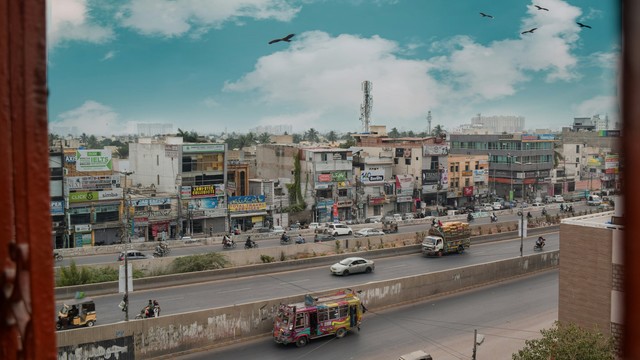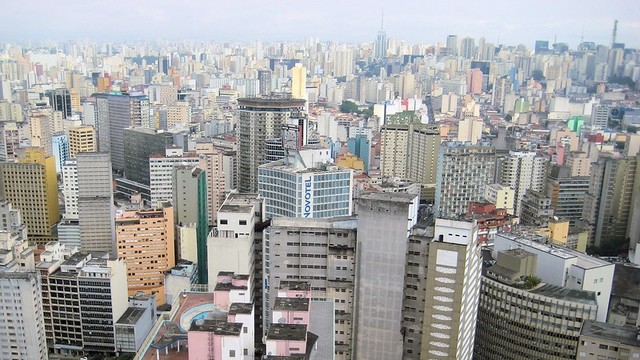Building trust through dialogue with street-food vendors
Street-food vendors' businesses are often threatened in the name of progress, but a new initiative from IIED and Hivos is looking to bridge the divide, protecting livelihoods and an important source of cheap food.


Relocated street vendors operate in the car park below the alun-alun of the Masjid Raya Mosque in Bandung, but this basement area does not attract many customers and vendors have to breathe in car and motorcycle fumes due to the poor air circulation (Photo: Kemal Jufri/Panos Pictures)
Mas Jo is an informal street-food vendor, plying his trade to middle and low-income customers near the Technology Institute in Bandung, the capital of the Indonesian province of West Java.
"I sell gastronomic specialities from Yogyakarta, in Central Java," he says, showing me his Facebook page, Twitter account and YouTube commercial on his smartphone. "That is what makes my business successful: people come here to eat a different food. It's my niche. I am not moving."
But move he must, according to municipal legislation intended to regulate where the city's 20,000 food vendors can sell their goods.
This gap between government plans and vendors' preferences reveals that the city is far from ensuring it has an inclusive food system that meets poorer people's needs.
Demand and supply
Those needs are growing. Indonesia has seen rapid population growth and urbanisation since 2000. By 2010, Bandung's wider metropolitan area was home to 7 million people. Despite steady economic growth across Indonesia (5-6 per cent since 2010), the informal sector continues to provide a high share of employment.
Many food vendors are part of this informal sector. According to the Bandung Cooperatives, Industry and Trade Office, there were more than 20,000 food vendors in 2012 – a likely underestimate given the informal nature of the businesses. The vast majority come from outside the province, with only 10 per cent native to Bandung.
Clamping down
Municipal governments around the world have clamped down on vendors (PDF) in the name of promoting formal and modern food distribution, improving food safety, modernising and greening cities, improving law and order, and reducing traffic congestion.
But this approach tends to overlook the needs of low-income residents who rely on food vendors for their meals.
In 2012, Bandung's municipal authority passed legislation on public order and city cleanliness, focusing on relocating and reorganising street vending. The city is now divided into zones: red, where vendors cannot trade; yellow, where they can trade at certain times; and green, where they can trade freely.
Despite the authority's attempt to reach a compromise with representatives of some food vendors, discontent is widespread. "There is no real recognition of street vendors [and our needs] from the government," said Mujahidin Saleh, head of a 100-strong cooperative of food vendors.
Below is a playlist of three video interviews, recorded in mid-September 2015 in Bandung, Indonesia, illustrating the urban food systems in Indonesia. The interviews can also be viewed on IIED's YouTube channel.
Dirty alternative
In some areas, vendors accepted the relocation incentive of IDR2.5-5 million (USD$187-370) only to see newcomers occupy their former spot. In other areas, vendors like Mas Jo have decided not to move, despite the new law.
For many vendors, the costs of moving are more than economic. Vendors operating around the large open area (the alun-alun) in front of the Masjid Raya Mosque in downtown Bandung were relocated to the underground car park directly beneath their old pitches as a result of the zoning.
The alun-alun looks nice at night: a great green square within a densely populated city. But the new vending zone is not so pleasant — vendors complain not only of a sharp decrease in customers and profits, but also about the discomfort of working in a hot, humid area with poor air circulation, and saturated with exhaust fumes.
Opening a door to dialogue
Informal street vendors and modern urban planning struggle to coexist. But there are examples of successful dialogue between the two parties, like the one President Joko Widodo achieved in Surakarta when he was city mayor.
Faced with a similar relocation issue, Widodo organised up to 54 meetings to speak directly with vendors and reach agreement. By treating vendors with respect and dignity (in Javanese, Nguwongke: 'to make other people feel human') he built the trust between institutions and informal vendors necessary to achieve a real dialogue.
In Bandung, IIED and Hivos are collaborating with local partners to create a safe space for dialogue between vendors, local government, consumers and other key stakeholders. The aim of this 'Food Lab' is to support communities in creating and sharing evidence, which in turn will contribute to the design of inclusive public policies that protect and improve the food systems of the urban poor.
"The Food Lab is a place where we can try to solve these problems together", says Seterhen 'Saska' Akbar, the chief executive of the NGO Laboratorium Riset Indie, lead partner for the Food Lab in Bandung. "We hope this can be a template [for] solving urban problems.
"With this communal action there will be positive changes," he says. "You can never do things on your own, with your own perspective. You have to talk to each other. You have to collaborate."
For food vendors like Mas Jo, dialogue-based solutions with the authorities are both a matter of business and dignity. For their customer is often a matter of whether they will eat today, or not.
Paolo Cravero (paolo.cravero@iied.org) is a researcher in IIED's Human Settlements Group.



